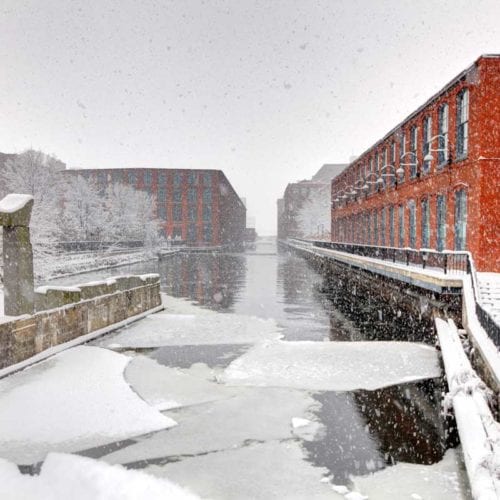
eLab Accelerator 2019
Energy Shift Pilot Project

Project Objective
To create a pathway for natural gas companies to transition to electricity-enabled renewable heating of buildings through street segment ground-coupled heat pumps.
October 2021 update: HEET’s GeoGrid idea is gaining traction—with one demonstration project already under way, and many others pending.
Post-Accelerator blog from the team: https://rmi.org/pipes-or-wires
Latest information about GeoGrid on HEET’s website: https://heet.org/geogrid

Team Members
- Ania Camargo, Gas Leak Allies
- Garen Ewbank, GreyEdge
- Zeyneb Magavi, HEET
- Nathan Phillips, Boston University
- Audrey Schulman, HEET
Project Description
The team will refine a pilot project design for the Energy Shift framework, where a gas company in Massachusetts will provide renewable BTUs through street-segment ground-coupled heat pumps district energy to a participating street or community. The team will also consider opportunities to scale beyond the first pilot, giving customers the ability to choose whether to get their renewable energy delivered through wires and/or pipes. The team consists of leaders from HEET, geothermal experts, and gas utilities in Massachusetts.
Progress Made to Date (pre-Accelerator)
HEET has commissioned a feasibility study for the project to de-risk the proposal for all; the draft of the study will be complete ahead of Accelerator, and will feed into the team’s discussions at the event.
Project Background Information
Massachusetts gas companies are in the midst of a 20-year program to replace the 26% of the underground gas infrastructure that is aging. The total cost will be over $9 billion. The cost is paid for by ratepayers depreciated over four decades. These new fossil fuel pipes pipes will last 60 years, long past when many people with discretionary income will have transitioned to air source heat pumps. The cost of the new pipes spread across fewer ratepayers will raise the price of gas dramatically, in turn increasing the flight of customers. The result will create a death spiral for the gas companies, with the rising cost being primarily born by those who can not afford to transition.
Instead, the team strives to design a pilot that will offer street-segments worth of customers the choice of using the gas-pipe-replacement funding to transition to modern micro-district heating powered by geothermal. Geothermal, brought to scale by a utility, and depreciated over 40 years, can be an attractive investment. It would reduce the company’s dependence on gas’s volatile price, while potentially adding the ability to offer customers cooling during the summer.
Given the 2018 catastrophic overpressurization of the Columbia Gas system in the Merrimack Valley (where 80 homes caught on fire), safety is critical. An over-pressurized geothermal system would not blow up homes, but just create a puddle. The insurance costs would be lower.
Replacing leak-prone gas pipes with geothermal micro-districts would prune the “tree” of leak-prone pipes, while growing scalable, safer and more resilient new trees made of interconnected geothermal district energy; a better long-term investment for customers, gas companies and the planet.